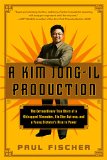Summary | Excerpt | Reviews | Beyond the Book | Readalikes | Genres & Themes | Author Bio

The Extraordinary True Story of a Kidnapped Filmmaker, His Star Actress, and a Young Dictator's Rise to Power
by Paul Fischer
Shin Sang-Ok was fifty-five years old, divorced, with four children. He was the most famous filmmaker in his native South Korea, where he had made blockbusters, won every possible award, and rubbed shoulders with presidents. Four years earlier his ex-wife, Choi Eun-Hee the most famous actress in South Korea, had disappeared while in Hong Kong, and when he went to find her he had been tricked and kidnapped. Now, after an initial period of less stringent house arrest, he was trapped in Prison Number 6, two hours outside of Pyongyang, North Korea.
No, Shin did not know anyone, and he still did not know why he had been taken. But he did know one thing.
He knew who had ordered his abduction.
In Pyongyang, miles away from the reeking cells and corridors of Prison Number 6, Kim Jong-Il knocked back his Hennessy, put the glass down, and watched as a waiter silently poured him a refill.
The party in full flow around him was one of the weekly banquets that Kim held for top members of the Workers' Party Central Committee. The large, bright hall was decorated with an explosion of garish fake flowers and swiveling colored lights. At the tables laid out around the dancing area, party cadres and Central Committee officers were eating the finest food, both Western (lobster, steak, pastries) and Korean (including cold noodles, kimchi, boshintang or dog soup, shark-fin soup, jokbal or pig's feet in soy sauce and spices, bears' feet flown in from Rus sia). They drank cognac, champagne, soju (rice liquor), and other North Korean specialties such as ginseng wine, with the roots still twisting inside the bottle, and snake liquor, a thick, venomous asp infusing in each jar of grain alcohol. Beautiful young women, aged fifteen to twenty-two, moved across the hall, dancing, flattering, giggling. They wore revealing clothes and some of them gave massages; many would later perform sexual ser vices for the guests. Known as the Gippeumjo, or Joy Brigade, the girls had been handpicked from schools across the country and trained, for up to six months, in manners, comportment, and sexual and massage techniques. While they served, they were banned from any contact with their families, who were rewarded handsomely for the privilege of having a daughter in such a favored position. It was said Kim Jong-Il selected all members of the Gippeumjo himself.
Musicians played a mix of North Korean and Russian folk songs as well as contemporary South Korean pop hits. Virtually all adult Korean males of the time smoked, and the air was thick with tobacco. After dinner the men would gamble—mah-jongg or blackjack— and dance the fox trot, disco, or blues with the girls provided.
Kim sat at the head table. He had a plump, oval face, black eyes, a small mouth with full lips, and a wide, short nose. He wore square-shaped glasses, smaller than those for which he would later be famous, and favored gray or blue in his Mao-collared tunics, not the khaki he would adopt in the last decades of his life. He was five foot two but wore five-inch platform shoes and sported a tall, boyish bouffant hairstyle to disguise his small stature (the girls of the Joy Brigade were required to be five foot two or shorter, just in case). He was the son of Great Marshal Kim Il-Sung, military hero and founder and Supreme Leader of the Democratic People's Republic of Korea. Officially Jong-Il was the head of the Propaganda and Agitation Department and the director of its Movie and Arts Division, but while his father was still the country's official leader, by 1982 Jong-Il had effectively taken control. Schoolchildren around the country were told he was kind, sensitive, and caring; and were taught to call him Dear Leader. He was forty-one years old, and the North Korean public had never heard his voice.
Usually Jong-Il was the heart and soul of these gatherings, boasting and telling dirty jokes, instructing the band, and generally enjoying the fawning deference of lackeys who jumped to their feet whenever he called.
Excerpted from A Kim Jong-Il Production by Paul Fischer. Copyright © 2015 by Paul Fischer. Excerpted by permission of Flatiron Books. All rights reserved. No part of this excerpt may be reproduced or reprinted without permission in writing from the publisher.
Your guide toexceptional books
BookBrowse seeks out and recommends the best in contemporary fiction and nonfiction—books that not only engage and entertain but also deepen our understanding of ourselves and the world around us.